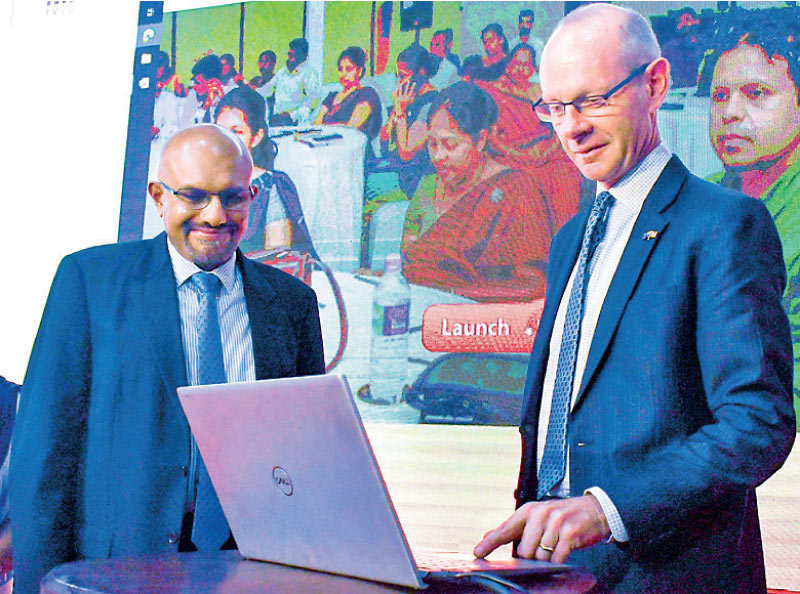Thursday Feb 19, 2026
Thursday Feb 19, 2026
Monday, 18 September 2023 01:50 - - {{hitsCtrl.values.hits}}

Australian High Commissioner to Sri Lanka Paul Stephens and District Secretary Anuradhapura J.M.J.K. Jayasundara launch the Skills Strategic Action Plan on the website

Australian High Commissioner to Sri Lanka Paul Stephens unveils the plaque to mark the opening of the industrial kitchen training facility at NAITA Anuradhapura with NAITA Vice Chairman H.S. Harischandra and Matale Additional District Secretary F.R.M. Riyaldeen, while Chefs Guild of Lanka Chef Director Planning Chef Madhawa Weerabaddhana looks on
The Australian High Commissioner to Sri Lanka, Paul Stephens, in collaboration with the Tertiary Vocational Education Commission (TVEC), recently launched the district skills development plans supporting tourism development with representatives from the district secretariats of Anuradhapura and Matale.
The skills development plans have been developed by industry and government stakeholders under the leadership of District Government Agents, with technical support from the Australian Aid-funded Skills for Inclusive Growth (S4IG) program. Each district plan provides a comprehensive, tailor-made approach to tourism development through strategic partnerships and priority actions agreed between the district secretariats, tourism-related government bodies and private enterprises.
Each district skills plan is the culmination of extensive research and consultation with tourism industry stakeholders to identify challenges to tourism-related economic development and inclusive growth opportunities. The plans identify actions that have been agreed to be taken by the private sector, Micro, Small and Medium Enterprises (MSMEs) and actors in the tourism value chain - in partnership with the Government and training institutions such as NAITA and VTA, in support of economic growth in the region. As a result, skills gaps can now be addressed and employers can secure the skills necessary to elevate the tourism sector in both districts. This fosters economic growth and promotes Sri Lanka as a premier tourist destination.
Each skills plan incorporates a range of innovative initiatives, including skills identification programs to ensure that enterprises can meet visitor demands and expectations. Key priorities include digital skills training to help businesses generate higher-quality digital content and engagement of district tourism assets, culinary arts and kitchen operation skills, professional business coaching to support business improvements, skills to improve hotel operations and tour guiding. It aims to support enterprises to increase revenue and create improved employment for local communities, giving priority to the tourism and hospitality sectors. A key focus of the plan is to create employment opportunities for women and persons with disabilities. The plans are now available through TVEC, the agency responsible for quality assurance of vocational training in Sri Lanka who will extend this innovative planning approach to other districts in Sri Lanka. Inaugural industrial culinary training facility at NAITA Anuradhapura
High Commissioner Stephens also inaugurated the industrial culinary training facility at the National Apprentice and Industrial Training Authority (NAITA) in Anuradhapura. With S4IG›s support, the facility will serve as a hub for nurturing aspiring chefs, providing students with industry recognised skills training, qualifications and job placements in hotels and kitchens. This would lead to a higher income generation potential in hotel kitchens and restaurants, helping to meet demand across the tourism sector.
The Australian High Commissioner expressed confidence in the initiatives’ potential for transformative change, saying “Australia’s support to these initiatives continues our commitment to fostering a skilled workforce in the tourism sector. Together, we are laying the foundation for sustainable development and economic growth in Sri Lanka.»
This integrated approach to skills development and economic advancement is poised to reshape the tourism and hospitality sectors, addressing critical skills gaps through internationally-recognised training and providing a catalyst for inclusive growth and improved employment opportunities for those aspiring for careers in professional cooking.